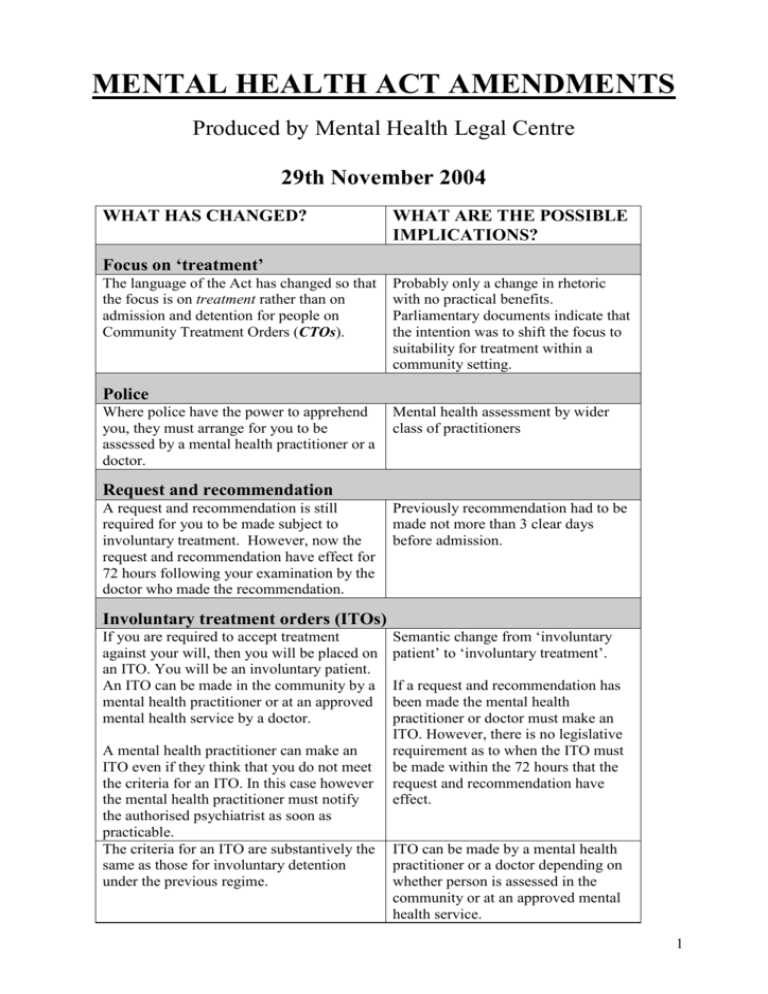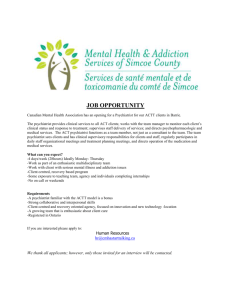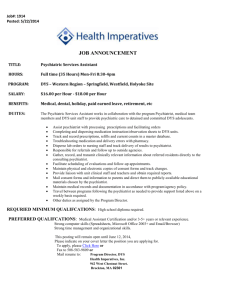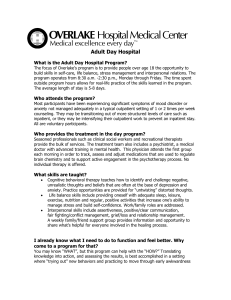What are the possible implications?
advertisement

MENTAL HEALTH ACT AMENDMENTS Produced by Mental Health Legal Centre 29th November 2004 WHAT HAS CHANGED? WHAT ARE THE POSSIBLE IMPLICATIONS? Focus on ‘treatment’ The language of the Act has changed so that the focus is on treatment rather than on admission and detention for people on Community Treatment Orders (CTOs). Probably only a change in rhetoric with no practical benefits. Parliamentary documents indicate that the intention was to shift the focus to suitability for treatment within a community setting. Police Where police have the power to apprehend you, they must arrange for you to be assessed by a mental health practitioner or a doctor. Mental health assessment by wider class of practitioners Request and recommendation A request and recommendation is still required for you to be made subject to involuntary treatment. However, now the request and recommendation have effect for 72 hours following your examination by the doctor who made the recommendation. Previously recommendation had to be made not more than 3 clear days before admission. Involuntary treatment orders (ITOs) If you are required to accept treatment against your will, then you will be placed on an ITO. You will be an involuntary patient. An ITO can be made in the community by a mental health practitioner or at an approved mental health service by a doctor. A mental health practitioner can make an ITO even if they think that you do not meet the criteria for an ITO. In this case however the mental health practitioner must notify the authorised psychiatrist as soon as practicable. The criteria for an ITO are substantively the same as those for involuntary detention under the previous regime. Semantic change from ‘involuntary patient’ to ‘involuntary treatment’. If a request and recommendation has been made the mental health practitioner or doctor must make an ITO. However, there is no legislative requirement as to when the ITO must be made within the 72 hours that the request and recommendation have effect. ITO can be made by a mental health practitioner or a doctor depending on whether person is assessed in the community or at an approved mental health service. 1 The authorised psychiatrist must examine you if an ITO is made at least within 24 hours after the order is made. In confirming an ITO, the authorised psychiatrist must first consider whether treatment in the community (under a CTO) would be more appropriate. The CTO can be made in the community without the need to go to hospital. The 24-hour examination can occur in the community. Interim treatment Although a mental health practitioner can make an ITO only a medical practitioner employed by a mental health service can implement any interim treatment. Increased authority given to mental health practitioners. As was the case pre-amendment, in certain circumstances treatment can be given prior to examination by authorised psychiatrist. Community treatment orders (CTOs) You must be informed by your psychiatrist of the reasons why the CTO has been made and be given a copy of the order. While under the order you must be assessed at regular intervals If your CTO expires without being extended, you are no longer an involuntary patient. Should ensure greater information is given around reasons for involuntary treatment. This was already the position at common law (Wilson). Revocation of CTOs Your CTO can only be revoked on the grounds of non-compliance with the CTO or treatment plan if the authorised psychiatrist is satisfied on reasonable grounds that noncompliance means you are going to deteriorate and reasonable steps have been made (without success) to ensure compliance. Significant change in that it requires set steps to have been taken prior to revocation and reasonable grounds to support risk of deterioration. Treatment plans The authorised psychiatrist must prepare, regularly review and revise as required an individual treatment plan for you. If you were detained as an involuntary patient in hospital prior to 6th December 2004, the authorised psychiatrist has 6 months from the date you were detained to prepare the plan. Plans will provide you with a summary of what must be complied with while on the CTO and consequently what may result in revocation of an order. The amendments are silent as to precise time periods for review and revision of plans. 2 In preparing, reviewing and revising the treatment plan, the authorised psychiatrist must take into account: your wishes; or the wishes of your guardian, family member or primary carer, unless you object; or whether the treatment is only to promote and maintain your health or well-being; and any beneficial alternative treatments; and the nature and degree of significant risks associated with the treatment and alternative treatments. The amendments only require these factors to be ‘taken into account’ by the authorised psychiatrist and your wishes are only required to be taken into account ‘as far as they can be ascertained’. The treatment plan: must contain an outline of the treatment you are to receive; and may contain anything else the authorised psychiatrist thinks is appropriate. The Parliamentary documents indicated that the plans are intended to give clear guidance about your obligations and a clear statement of the treatment that you can expect. The authorised psychiatrist must give you a copy of the treatment plan and discuss it with you. Your treatment plan must be reviewed by the MHRB. This should facilitate greater understanding of treatment. If you are not happy with your treatment plan, you can appeal to the MHRB against it. On each appeal and review to the MHRB the treatment plan must be reviewed. MHRB may order a revision of the plan. If you are on a CTO, your treatment plan must also specify: who monitors and supervises the treatment; who your case manager is; the place you are to receive treatment; when you must attend for treatment; when your supervising doctor is to report to the monitoring psychiatrist. These provisions enable you to stay better informed about what your obligations are under your CTO and who is supposed to be involved in your treatment. MHRB will determine whether Mental Health Act has been complied with and whether plan is capable of being implemented by approved mental health service. 3 New powers of the Mental Health Review Board (MHRB) MHRB has the power to order the authorised psychiatrist to make a CTO within a reasonable period of time if the board considers that the treatment required can be obtained under a CTO. The ‘reasonable period of time’ has not been specified. The Explanatory Memorandum indicates the time period is so that accommodation and appropriate community support can be arranged by/for you. The Parliamentary documentation gives the example that it would not be reasonable to order immediate release on to a CTO if the person is homeless or if arrangements with family or carers have not been negotiated fully. Notice to case manager The authorised psychiatrist must provide a copy of the notice of the MHRB hearing to your case manager. This ensures that case managers are informed about the hearing and can take an active role in the MHRB process if they choose to. Sharing electronic records Clinical staff are allowed to share electronic records. Use of this information is protected by the Information Privacy Principles. Community Support Services are obligated to maintain confidentiality. DISCLAIMER OF LIABILITY: The Mental Health Legal Centre disclaims any liability for action taken or not taken as a result of this information. We encourage readers to seek out legal advice and representation wherever possible. F:\FIONA\EDUCATION SESSIONS\2004\Changes to Act\handout\Handout draft one sarah 19 Oct 04.doc 4








